#the boys discover the wonderful north american tradition of driving 6 hours to see a shitty museum and dinosaur statues
Text
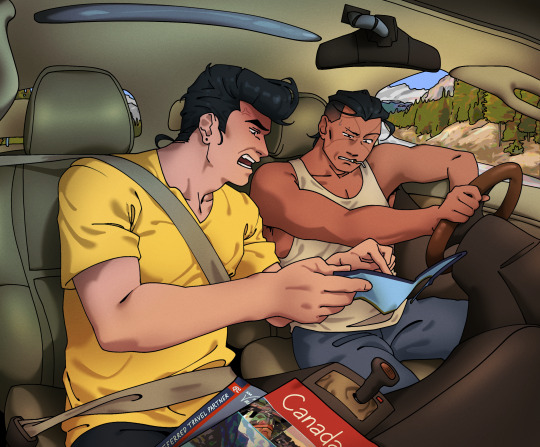
road trip 🚗💨
jsys week'24, day 4
#the boys discover the wonderful north american tradition of driving 6 hours to see a shitty museum and dinosaur statues#and all the horrible emotions that come with <3#josuke like we missed a turn THREE HOURS AGO!! FUCK YOU!!!!!!!!#also oku has no regard for road safety. no seatbelt hes going to go straight thru the windshield on those shitass unmaintained roads. KING!#josuyasu#josuyasu week#josuyasu week 2024#josuke higashikata#okuyasu nijimura#jojo#jojo's bizarre adventure#jjba#my art
2K notes
·
View notes
Text
10 Best Movies of 2019 (So Far)
With the summer movie season winding down, we look back at the top 10 films cinema has had to offer this far into 2019.

The summer movie season of 2019 is over. While the heat continues to swelter, and school by and large remains out, the final weekend of new Hollywood blockbuster extravaganzas has sped off the scene like a getaway car. And given the box office receipts for most of the studio tentpoles this year, we imagine the whole industry is ready to put the summer behind them. Be that as it may, cinema remains strong, hence why we think is the perfect time to look back on the year so far.
While many others like to take stock of the movie calendar at the literal halfway mark that occurs at the end of June, we prefer letting the biggest moviegoing season to wrap up and only start reflecting during the deep breath before film festivals like TIFF and Telluride kick off the awards season. Indeed, you’ll see below that this July and August have been unusually fruitful. Looking back at the first seven-plus months of 2019 reveals that, for whatever box office hand-wringing, it’s already been a promising time for new voices making an impact and legendary auteurs communicating with the changing filmmaking landscape. So without further ado, please join us in celebrating the top 10 movies of 2019. So far.

10. The Peanut Butter Falcon
Tall tales and the myths they build can be stronger than any river current in the American South. Many of the best works of fiction from that part of the country embrace such grandiosity, and The Peanut Butter Falcon is no exception. An infinitely sweet film populated with outsized personalities, directors Tyler Nilson and Mike Schwartz’s transcendentalist adventure was one of the biggest surprises out of SXSW earlier this year, and months later it still radiates an authentic breezy charm.
Very much a modern day Huckleberry Finn for those labeled as disabled or special needs, the film crafts its own legend around Zak (Zack Gottsagen), a young man with Down Syndrome that society wishes to forget. Save for Eleanor (Dakota Johnson), his concerned doctor at the retirement home the state abandoned him in, no one really cares when Zak escapes to chase his dream of becoming a professional wrestler. Yet a dispiriting prologue gives way to the loveliest journey as Zak befriends Tyler (Shia LaBeouf) and hitches a ride with the good ol’ boy on a raft floating down the North Carolina Outer Banks. It’s a movie happily supplied with homespun love and wonderfully textured characters, including all three leads, among whom LaBeouf proves nigh unrecognizable as the reluctant Good Samaritan by way of Mark Twain’s St. Petersburg.

9. Luce
The best movies provoke discussion, and few this year will be as challenging as the conversations borne by director Julius Onah and screenwriter J.C. Lee’s Luce. A film based on Lee’s own play, the movie interrogates the idea of the American Dream and wonders if even when it comes true, how much of that is a manipulation by those who espouse skepticism of it.
The film is about a star athlete and valedictorian named Luce (Kelvin Harrison Jr.). Actually, Luce was just what his parents (Naomi Watts and Tim Roth) made up after they adopted him from a war-torn African nation, unable to pronounce his birth name. Even so, he very much is their son and not only the apple of their eye, but that of his whole school. Perhaps this is why his teacher, Ms. Harriet Wilson (Octavia Spencer), holds him to a different standard than his other African American peers. It’s a story about a school-sized tinderbox of good intentions that threatens to ignite after Harriet finds illegal fireworks in Luce’s locker, all of which bubbles with the tension of a thriller even as it plays like a truth-searching drama. Luce is a Rorschach Test for both the characters and audiences to examine their own racial biases, and the hypocrisy of expectations. Nevertheless, the film exceeds ours.
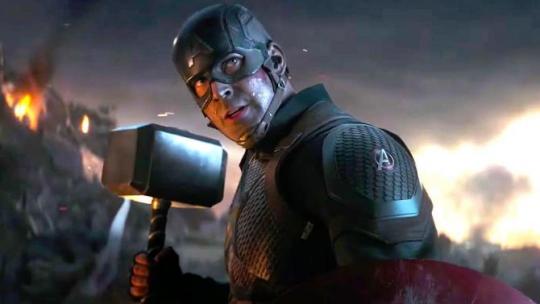
8. Avengers: Endgame
It would be easy in more cynical circles to shrug off Avengers: Endgame as the ultimate fan service movie, and in fact it is. But after 11 years of world-building, and the even more impressive franchise-building occurring outside of its continuity, Marvel Studios’ 22nd installment is the grandest of commercial and long-form narrative achievements. By making a series finale to all the movies that came before it, including the cliffhanger in Avengers: Infinity War, Marvel Studios President Kevin Feige and his legion of collaborators, most notably directors Joe and Anthony Russo, and Iron Man star Robert Downey Jr., find the rare quality that most eludes traditional television storytellers: a fully satisfying ending.
At three hours, Avengers: Endgame rises above almost anything else Marvel has ever produced and acts as a pseudo-manifesto for the studio. While many of the parts are lesser than the whole, the tight storytelling and tonal consistency over nearly two dozen films pays off with the kind of multi-tiered catharsis and spectacle that drives global moviegoers into theaters by the tens of millions. Not since the days of Cecil B. DeMille has there been an epic so brimming with familiar faces, but unlike the overstuffed Infinity War, this showmanship is wrapped in a bow of gracefulness. This is the ultimate Marvel Studios movie. With a renewal of the charisma and humanity Downey first brought to this enterprise, there is a creative spark shining bright here… and that leaves open the question of how Marvel can possibly repeat this high-note, both in terms of heart and gross, ever again.

7. Toy Story 4
Toy Story 4 didn't need to be made. The ending of 2010’s Toy Story 3 was the perfect conclusion to a saga that began the day a child named Andy first played with a cowboy doll called Woody. Yet we’re so glad that Toy Story 4 exists, as Pixar discovered a soulful epilogue to the characters who first made the studio the preeminent animation house of the 21st century. Essentially a coda to an already finished yarn, Pixar’s elegant solution to being required to return to the childhood daydream of Woody and Buzz Lightyear is to permanently wrap-up their shared journey in the most adult of ways.
On the surface, this is another story about Woody (Tom Hanks) trying to teach a wayward toy its purpose, in this case a do-it-yourself Frankenstein’s Monster named Forky (Tony Hale). But Toy Story 4 raises a much more interesting question about what would make Woody want to move on with his life as a lost toy? Experiencing something akin to a midlife crisis when he crosses paths with old flame Bo Peep (Annie Potts), Woody is asked to change his perspective of what life is meant to be after reaching a certain age, just as a post-John Lasseter Pixar discovers a new and hopefully more inclusive identity. This movie does, after all, finally give Bo Peep depth and a humanity as heart-rending as anything to do with the cowboy that has a snake in his boot. Not bad for characters made of cloth and porcelain.
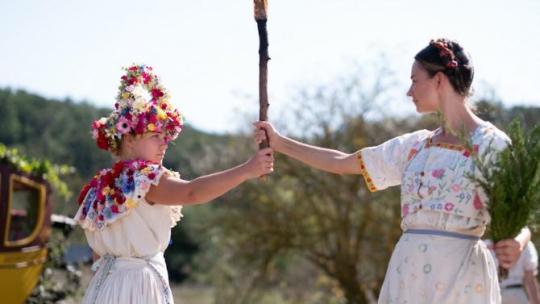
6. Midsommar
If you ever wanted a movie to burn down your toxic relationship, Midsommar is gasoline that comes with already lit flames. As Ari Aster’s heartfelt explanation of why some people do not belong together, this Swedish set film turns cult-based horror on its head and reverses everything you might expect from the director of Hereditary. Bringing horror out into the sunshine, Midsommar presents a world that is as shadowless as it is pitiless.
Taking place almost entirely during the July rituals of an obscure (and fictional) Pagan commune, the film provides a set of antagonists who might kill you with kindness while displaying an egalitarian empathy as foreign to modern (and selfish) American traditions as their deadlier customs. This creates a striking backdrop to a potent allegory about why Florence Pugh’s Dani and Jack Reynor’s Christian really should have broken up long ago. Pugh is especially haunting as a young woman who’s in a state of perpetual trauma after hanging on to a worn-out band aid in need of tearing for six months. Her harrowing epiphany adds an insidious persuasiveness to cruel machinations that turn cooing Millennial intellectuals into horror’s new dumb American red meat. And the fumes produced by their roasting are quite beautiful, indeed.

5. The Farewell
Another film about the shock incurred by contrasting cultures, The Farewell is also a gorgeously realized portrait of a woman who feels drawn yet alienated by both sides of her identity. But whatever confusion she might experience is supplanted by an absolute love for her grandmother and the connection that elder represents to an ever-fading past. Writer-director Lulu Wang’s incredibly personal drama is equal parts hilarious and heartbreaking, all while never once making a single false step in its unusual path through grief—one that must be made in total silence.
The Farewell centers on Awkwafina’s Billi, a 30-year-old New Yorker who was born in China and was only six when her parents moved to the States, leaving a vague impression of an idyllic childhood with her grandmother Nai Nai (Shuzhen Zhou). However, what exactly this feeling of severed identity means to Billi comes to the surface when Nai Nai is diagnosed with lung cancer… something that her family will not tell her of because in China, it is the family’s emotional burden to carry the knowledge of a seeming death sentence. Believing she only is suffering from a cold, Nai Nai is thrilled that her adult children from America and Japan are returning home for a wedding that is in reality a pretense for everyone to say goodbye—although not Billi. Her parents think she’ll crack and admit this pantomime. Thus she must crash her grandmother’s own living wake.
Billi’s saddened homecoming is constantly juxtaposed by her grandmother’s glowing delight to have a full house again. Occupying the space between tragedy and joy, Billi’s Western apprehension to Chinese custom and her longing to reconnect with it, Wang finds a canvas to paint every shade of anguish and exhilaration offered by nostalgia and an unfamiliar heritage. Awkwafina also confirms she is a star on the rise by carrying this intimate tragi-comedy with a role that requires her to speak in English, in Chinese, and most impressively not at all, while still saying everything.
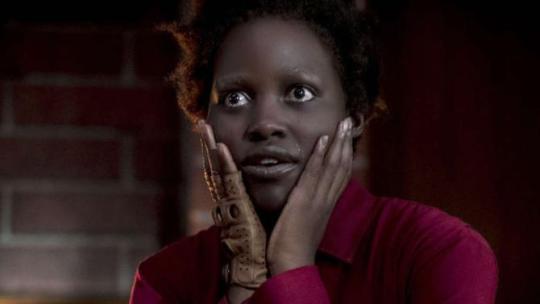
4. Us
Jordan Peele follows up his directorial debut with another horror movie that will be dissected and debated for a long time to come. More ambitious than Get Out, and arguably the most vividly photographed chiller in ages, Us is bigger but still razor-focused on its subject. A massive allegory about class warfare turning storybook supernatural, Peele imagines a conflict between the haves and have-nots in American society while noting that, at the heart of the matter, they’re the same exact type of people.
With a deft touch and sense of humor that is as refreshing as it was in Get Out, Peele introduces audiences to the Wilson family, who have seemingly everything but are still envious of keeping up with the proverbial (white) Joneses. For patriarch Gabe (Winston Duke), this can be accepted as a point of obliviousness, but Lupita Nyong’o’s Adelaide cannot feign such innocence as she has seen the face of want and hunger—it was her own—and she left it to rot. Yet it rises for her again when “Red,” her doppelganger she once spied in a funhouse mirror, comes home with equally twisted doubles of her family. It is a tour de force showcase for Nyong’o, who gives an Oscar-worthy turn as both Adelaide and Red. Us provides a juicy parable as rich as the best Twilight Zone storytelling by Rod Serling that inspired it. The end might overreach, but the breadth of its vision and arm remains an inspiration.

3. The Last Black Man in San Francisco
You cannot hate a place unless you love it. This is a paradox that Joe Talbot and Jimmie Fails’ The Last Black Man in San Francisco posits with illuminating insight. An epic poem for the modern age of gentrification, this is a movie that focuses on a Bay City whose skyrocketing real estate has pushed the faces and hands that built its skyline to the fringes. It’s a fact of life encapsulated by an opening image of a young black girl going to school by the edge of saltwater so poisonous that city employees will only venture there in hazmat suits.
Pushed literally to the edge of society, Jimmie Fails—a character played by the man who has lived this life and wrote the story down—dreams of reclaiming what was once his family’s birthright: a Victorian home in the Golden Gate area that his grandfather claims to have built with his own hands. It is now owned by a privileged middle aged white couple, yet when they enter into an inheritance dispute with relatives, an opportunity opens up for Jimmie and his best friend Montgomery (Jonathan Majors) to move in as squatters.
This is a lyrical love letter to cities that no longer exist, and landscapes that once allowed dignity for those who toiled in them. Obviously it is Jimmie’s personal life story, but it is the insights of Montgomery, Emile Mosseri’s mournful score, and Adam Newport-Berra’s surreal camera setups that elevate Last Man’s song and verse into a celestial elegy. One which provides as much hope as it does despair.
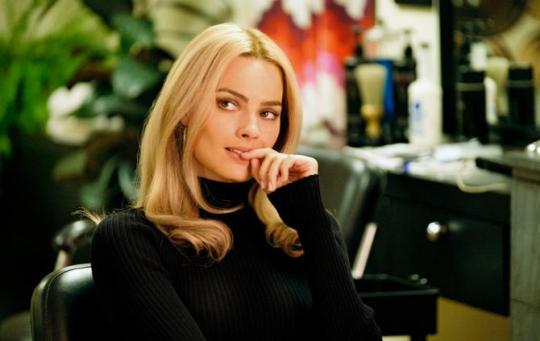
2. Once Upon a Time in Hollywood
The arrival of a new Quentin Tarantino movie always comes with debate and some degree of controversy. But when the smoke clears, Once Upon a Time… in Hollywood will be remembered as one of his very best. A film that demands multiple viewings, Once Upon a Time is the rare major studio movie that requires you to meet it on its own terms, a sad fact Tarantino is aware of and deconstructs with a surprising degree of wistful melancholy.
An obvious love letter to the long-gone Hollywood of the 1960s, which by ’69 saw the studio system in its death throes, the movie is also a commentary of our own cultural moment where auteurs pursuing massive original ideas, like Tarantino, and movie stars not defined by what cape they’ve worn on screen, like Leonardo DiCaprio and Brad Pitt, are almost a thing of the past. Tarantino’s elegiac meditation is as much about his and movie stars’ own setting sun as it is the Hollywood movies he grew up on, but it is also an unimaginably ambitious and celebratory film that dismisses plot and audience expectations that have been flattened by a decade of formula. Here is a film that revels in just chilling out with morally ambiguous characters while also offering a vessel that connects the past and present via giddy historical revisionist madness.
Starring DiCaprio and Pitt as fading TV star Rick Dalton and his stuntman Cliff Booth, the film champions the intangible alchemy between charisma and cinema, providing both with their best material in years. Pitt may, in fact, have never been better than as the smiling cowboy whose high noon is with a counterculture that is burying his and Rick’s livelihoods. Their journeys, meanwhile, are paralleled by the rise of a new star named Sharon Tate (Margot Robbie) and the youthful change she represents. The importance of Sharon, and her subtly interconnected world, is determined by how much you know of her going in. For those who do, she is more than just the idol of her age; she is the soul of Tarantino’s sweetest movie, both in terms of its ‘60s setting and its desire to divorce a lifetime of light from the specter of Charles Manson’s half-century of darkness. Unlike Tarantino’s last three pictures, this isn’t about revenge; it’s a bedtime yarn dreaming of salvation for Hollywood, for culture, and for a legacy that can live on past 26 years.

1. Booksmart
Despite her celebrity, Olivia Wilde has always seemed a little underrated as an actor. That should change going forward as Wilde also announces herself as a major directorial talent with Booksmart. A pitch-perfect comedy that writes a teen anthem for the next generation, Booksmart proves that the cinematic R-rated comedy is not dead, and further it can only get better as it invites new diverse voices to reconfigure the form.
Among those voices accompanying Wilde are screenwriters like Susanna Fogel and Katie Silberman, and a fresh-faced cast that is more than game to refocus the coming-of-age narrative on the type of nerdy young women who previously might’ve been lucky to be in the fuzzy background, if included at all. Kaitlyn Dever and Beanie Feldstein make a banquet out of protagonists Amy and Molly, two Type A’s who are Ivy League-bound and think the perfect night before graduation is watching Ken Burns documentaries. But upon realizing that all the supposed flakes they wrote off in their senior class are also headed toward bright futures after four years of partying, Molly will make up for missing out by dragging Amy on an odyssey toward the perfect Gen-Z high school party.
So there you have it, the 10 best movies of the year so far. Agree? Disagree? Did we leave something off? Let us know in the comment section below!
Sourcehttps://www.denofgeek.com/us/movies/282640/best-movies-2019
Read the full article
0 notes
Text
10 Best Movies of 2019 (So Far)
With the summer movie season winding down, we look back at the top 10 films cinema has had to offer this far into 2019.
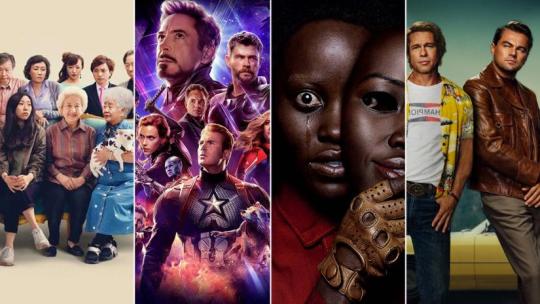
The summer movie season of 2019 is over. While the heat continues to swelter, and school by and large remains out, the final weekend of new Hollywood blockbuster extravaganzas has sped off the scene like a getaway car. And given the box office receipts for most of the studio tentpoles this year, we imagine the whole industry is ready to put the summer behind them. Be that as it may, cinema remains strong, hence why we think is the perfect time to look back on the year so far.
While many others like to take stock of the movie calendar at the literal halfway mark that occurs at the end of June, we prefer letting the biggest moviegoing season to wrap up and only start reflecting during the deep breath before film festivals like TIFF and Telluride kick off the awards season. Indeed, you’ll see below that this July and August have been unusually fruitful. Looking back at the first seven-plus months of 2019 reveals that, for whatever box office hand-wringing, it’s already been a promising time for new voices making an impact and legendary auteurs communicating with the changing filmmaking landscape. So without further ado, please join us in celebrating the top 10 movies of 2019. So far.
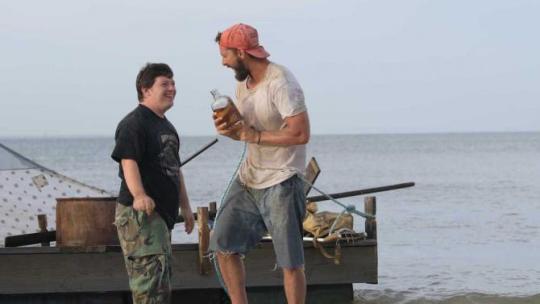
10. The Peanut Butter Falcon
Tall tales and the myths they build can be stronger than any river current in the American South. Many of the best works of fiction from that part of the country embrace such grandiosity, and The Peanut Butter Falcon is no exception. An infinitely sweet film populated with outsized personalities, directors Tyler Nilson and Mike Schwartz’s transcendentalist adventure was one of the biggest surprises out of SXSW earlier this year, and months later it still radiates an authentic breezy charm.
Very much a modern day Huckleberry Finn for those labeled as disabled or special needs, the film crafts its own legend around Zak (Zack Gottsagen), a young man with Down Syndrome that society wishes to forget. Save for Eleanor (Dakota Johnson), his concerned doctor at the retirement home the state abandoned him in, no one really cares when Zak escapes to chase his dream of becoming a professional wrestler. Yet a dispiriting prologue gives way to the loveliest journey as Zak befriends Tyler (Shia LaBeouf) and hitches a ride with the good ol’ boy on a raft floating down the North Carolina Outer Banks. It’s a movie happily supplied with homespun love and wonderfully textured characters, including all three leads, among whom LaBeouf proves nigh unrecognizable as the reluctant Good Samaritan by way of Mark Twain’s St. Petersburg.
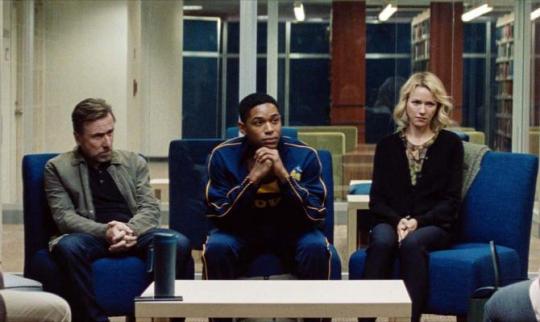
9. Luce
The best movies provoke discussion, and few this year will be as challenging as the conversations borne by director Julius Onah and screenwriter J.C. Lee’s Luce. A film based on Lee’s own play, the movie interrogates the idea of the American Dream and wonders if even when it comes true, how much of that is a manipulation by those who espouse skepticism of it.
The film is about a star athlete and valedictorian named Luce (Kelvin Harrison Jr.). Actually, Luce was just what his parents (Naomi Watts and Tim Roth) made up after they adopted him from a war-torn African nation, unable to pronounce his birth name. Even so, he very much is their son and not only the apple of their eye, but that of his whole school. Perhaps this is why his teacher, Ms. Harriet Wilson (Octavia Spencer), holds him to a different standard than his other African American peers. It’s a story about a school-sized tinderbox of good intentions that threatens to ignite after Harriet finds illegal fireworks in Luce’s locker, all of which bubbles with the tension of a thriller even as it plays like a truth-searching drama. Luce is a Rorschach Test for both the characters and audiences to examine their own racial biases, and the hypocrisy of expectations. Nevertheless, the film exceeds ours.

8. Avengers: Endgame
It would be easy in more cynical circles to shrug off Avengers: Endgame as the ultimate fan service movie, and in fact it is. But after 11 years of world-building, and the even more impressive franchise-building occurring outside of its continuity, Marvel Studios’ 22nd installment is the grandest of commercial and long-form narrative achievements. By making a series finale to all the movies that came before it, including the cliffhanger in Avengers: Infinity War, Marvel Studios President Kevin Feige and his legion of collaborators, most notably directors Joe and Anthony Russo, and Iron Man star Robert Downey Jr., find the rare quality that most eludes traditional television storytellers: a fully satisfying ending.
At three hours, Avengers: Endgame rises above almost anything else Marvel has ever produced and acts as a pseudo-manifesto for the studio. While many of the parts are lesser than the whole, the tight storytelling and tonal consistency over nearly two dozen films pays off with the kind of multi-tiered catharsis and spectacle that drives global moviegoers into theaters by the tens of millions. Not since the days of Cecil B. DeMille has there been an epic so brimming with familiar faces, but unlike the overstuffed Infinity War, this showmanship is wrapped in a bow of gracefulness. This is the ultimate Marvel Studios movie. With a renewal of the charisma and humanity Downey first brought to this enterprise, there is a creative spark shining bright here… and that leaves open the question of how Marvel can possibly repeat this high-note, both in terms of heart and gross, ever again.
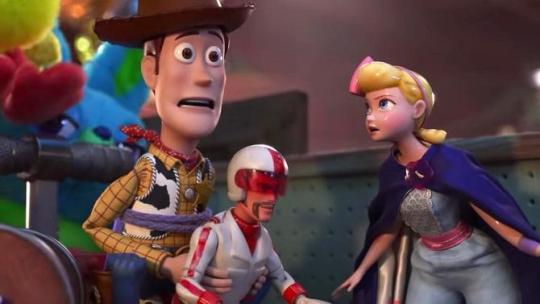
7. Toy Story 4
Toy Story 4 didn't need to be made. The ending of 2010’s Toy Story 3 was the perfect conclusion to a saga that began the day a child named Andy first played with a cowboy doll called Woody. Yet we’re so glad that Toy Story 4 exists, as Pixar discovered a soulful epilogue to the characters who first made the studio the preeminent animation house of the 21st century. Essentially a coda to an already finished yarn, Pixar’s elegant solution to being required to return to the childhood daydream of Woody and Buzz Lightyear is to permanently wrap-up their shared journey in the most adult of ways.
On the surface, this is another story about Woody (Tom Hanks) trying to teach a wayward toy its purpose, in this case a do-it-yourself Frankenstein’s Monster named Forky (Tony Hale). But Toy Story 4 raises a much more interesting question about what would make Woody want to move on with his life as a lost toy? Experiencing something akin to a midlife crisis when he crosses paths with old flame Bo Peep (Annie Potts), Woody is asked to change his perspective of what life is meant to be after reaching a certain age, just as a post-John Lasseter Pixar discovers a new and hopefully more inclusive identity. This movie does, after all, finally give Bo Peep depth and a humanity as heart-rending as anything to do with the cowboy that has a snake in his boot. Not bad for characters made of cloth and porcelain.
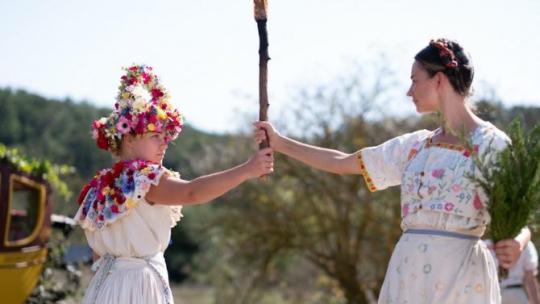
6. Midsommar
If you ever wanted a movie to burn down your toxic relationship, Midsommar is gasoline that comes with already lit flames. As Ari Aster’s heartfelt explanation of why some people do not belong together, this Swedish set film turns cult-based horror on its head and reverses everything you might expect from the director of Hereditary. Bringing horror out into the sunshine, Midsommar presents a world that is as shadowless as it is pitiless.
Taking place almost entirely during the July rituals of an obscure (and fictional) Pagan commune, the film provides a set of antagonists who might kill you with kindness while displaying an egalitarian empathy as foreign to modern (and selfish) American traditions as their deadlier customs. This creates a striking backdrop to a potent allegory about why Florence Pugh’s Dani and Jack Reynor’s Christian really should have broken up long ago. Pugh is especially haunting as a young woman who’s in a state of perpetual trauma after hanging on to a worn-out band aid in need of tearing for six months. Her harrowing epiphany adds an insidious persuasiveness to cruel machinations that turn cooing Millennial intellectuals into horror’s new dumb American red meat. And the fumes produced by their roasting are quite beautiful, indeed.
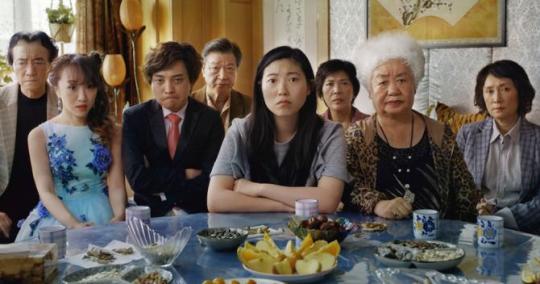
5. The Farewell
Another film about the shock incurred by contrasting cultures, The Farewell is also a gorgeously realized portrait of a woman who feels drawn yet alienated by both sides of her identity. But whatever confusion she might experience is supplanted by an absolute love for her grandmother and the connection that elder represents to an ever-fading past. Writer-director Lulu Wang’s incredibly personal drama is equal parts hilarious and heartbreaking, all while never once making a single false step in its unusual path through grief—one that must be made in total silence.
The Farewell centers on Awkwafina’s Billi, a 30-year-old New Yorker who was born in China and was only six when her parents moved to the States, leaving a vague impression of an idyllic childhood with her grandmother Nai Nai (Shuzhen Zhou). However, what exactly this feeling of severed identity means to Billi comes to the surface when Nai Nai is diagnosed with lung cancer… something that her family will not tell her of because in China, it is the family’s emotional burden to carry the knowledge of a seeming death sentence. Believing she only is suffering from a cold, Nai Nai is thrilled that her adult children from America and Japan are returning home for a wedding that is in reality a pretense for everyone to say goodbye—although not Billi. Her parents think she’ll crack and admit this pantomime. Thus she must crash her grandmother’s own living wake.
Billi’s saddened homecoming is constantly juxtaposed by her grandmother’s glowing delight to have a full house again. Occupying the space between tragedy and joy, Billi’s Western apprehension to Chinese custom and her longing to reconnect with it, Wang finds a canvas to paint every shade of anguish and exhilaration offered by nostalgia and an unfamiliar heritage. Awkwafina also confirms she is a star on the rise by carrying this intimate tragi-comedy with a role that requires her to speak in English, in Chinese, and most impressively not at all, while still saying everything.

4. Us
Jordan Peele follows up his directorial debut with another horror movie that will be dissected and debated for a long time to come. More ambitious than Get Out, and arguably the most vividly photographed chiller in ages, Us is bigger but still razor-focused on its subject. A massive allegory about class warfare turning storybook supernatural, Peele imagines a conflict between the haves and have-nots in American society while noting that, at the heart of the matter, they’re the same exact type of people.
With a deft touch and sense of humor that is as refreshing as it was in Get Out, Peele introduces audiences to the Wilson family, who have seemingly everything but are still envious of keeping up with the proverbial (white) Joneses. For patriarch Gabe (Winston Duke), this can be accepted as a point of obliviousness, but Lupita Nyong’o’s Adelaide cannot feign such innocence as she has seen the face of want and hunger—it was her own—and she left it to rot. Yet it rises for her again when “Red,” her doppelganger she once spied in a funhouse mirror, comes home with equally twisted doubles of her family. It is a tour de force showcase for Nyong’o, who gives an Oscar-worthy turn as both Adelaide and Red. Us provides a juicy parable as rich as the best Twilight Zone storytelling by Rod Serling that inspired it. The end might overreach, but the breadth of its vision and arm remains an inspiration.
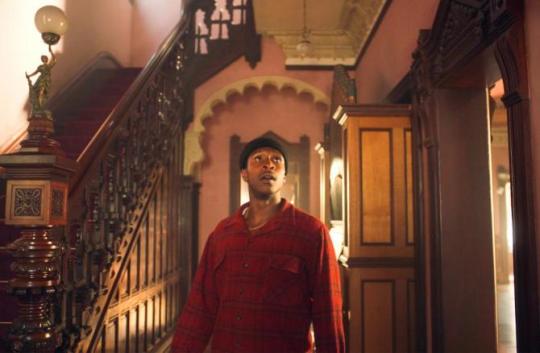
3. The Last Black Man in San Francisco
You cannot hate a place unless you love it. This is a paradox that Joe Talbot and Jimmie Fails’ The Last Black Man in San Francisco posits with illuminating insight. An epic poem for the modern age of gentrification, this is a movie that focuses on a Bay City whose skyrocketing real estate has pushed the faces and hands that built its skyline to the fringes. It’s a fact of life encapsulated by an opening image of a young black girl going to school by the edge of saltwater so poisonous that city employees will only venture there in hazmat suits.
Pushed literally to the edge of society, Jimmie Fails—a character played by the man who has lived this life and wrote the story down—dreams of reclaiming what was once his family’s birthright: a Victorian home in the Golden Gate area that his grandfather claims to have built with his own hands. It is now owned by a privileged middle aged white couple, yet when they enter into an inheritance dispute with relatives, an opportunity opens up for Jimmie and his best friend Montgomery (Jonathan Majors) to move in as squatters.
This is a lyrical love letter to cities that no longer exist, and landscapes that once allowed dignity for those who toiled in them. Obviously it is Jimmie’s personal life story, but it is the insights of Montgomery, Emile Mosseri’s mournful score, and Adam Newport-Berra’s surreal camera setups that elevate Last Man’s song and verse into a celestial elegy. One which provides as much hope as it does despair.
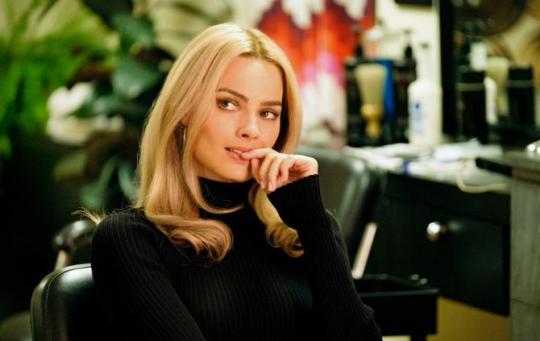
2. Once Upon a Time in Hollywood
The arrival of a new Quentin Tarantino movie always comes with debate and some degree of controversy. But when the smoke clears, Once Upon a Time… in Hollywood will be remembered as one of his very best. A film that demands multiple viewings, Once Upon a Time is the rare major studio movie that requires you to meet it on its own terms, a sad fact Tarantino is aware of and deconstructs with a surprising degree of wistful melancholy.
An obvious love letter to the long-gone Hollywood of the 1960s, which by ’69 saw the studio system in its death throes, the movie is also a commentary of our own cultural moment where auteurs pursuing massive original ideas, like Tarantino, and movie stars not defined by what cape they’ve worn on screen, like Leonardo DiCaprio and Brad Pitt, are almost a thing of the past. Tarantino’s elegiac meditation is as much about his and movie stars’ own setting sun as it is the Hollywood movies he grew up on, but it is also an unimaginably ambitious and celebratory film that dismisses plot and audience expectations that have been flattened by a decade of formula. Here is a film that revels in just chilling out with morally ambiguous characters while also offering a vessel that connects the past and present via giddy historical revisionist madness.
Starring DiCaprio and Pitt as fading TV star Rick Dalton and his stuntman Cliff Booth, the film champions the intangible alchemy between charisma and cinema, providing both with their best material in years. Pitt may, in fact, have never been better than as the smiling cowboy whose high noon is with a counterculture that is burying his and Rick’s livelihoods. Their journeys, meanwhile, are paralleled by the rise of a new star named Sharon Tate (Margot Robbie) and the youthful change she represents. The importance of Sharon, and her subtly interconnected world, is determined by how much you know of her going in. For those who do, she is more than just the idol of her age; she is the soul of Tarantino’s sweetest movie, both in terms of its ‘60s setting and its desire to divorce a lifetime of light from the specter of Charles Manson’s half-century of darkness. Unlike Tarantino’s last three pictures, this isn’t about revenge; it’s a bedtime yarn dreaming of salvation for Hollywood, for culture, and for a legacy that can live on past 26 years.
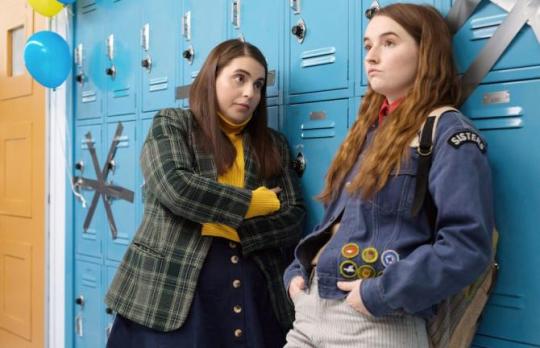
1. Booksmart
Despite her celebrity, Olivia Wilde has always seemed a little underrated as an actor. That should change going forward as Wilde also announces herself as a major directorial talent with Booksmart. A pitch-perfect comedy that writes a teen anthem for the next generation, Booksmart proves that the cinematic R-rated comedy is not dead, and further it can only get better as it invites new diverse voices to reconfigure the form.
Among those voices accompanying Wilde are screenwriters like Susanna Fogel and Katie Silberman, and a fresh-faced cast that is more than game to refocus the coming-of-age narrative on the type of nerdy young women who previously might’ve been lucky to be in the fuzzy background, if included at all. Kaitlyn Dever and Beanie Feldstein make a banquet out of protagonists Amy and Molly, two Type A’s who are Ivy League-bound and think the perfect night before graduation is watching Ken Burns documentaries. But upon realizing that all the supposed flakes they wrote off in their senior class are also headed toward bright futures after four years of partying, Molly will make up for missing out by dragging Amy on an odyssey toward the perfect Gen-Z high school party.
So there you have it, the 10 best movies of the year so far. Agree? Disagree? Did we leave something off? Let us know in the comment section below!
Sourcehttps://www.denofgeek.com/us/movies/282640/best-movies-2019
Read the full article
0 notes